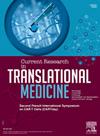Multidimensional evaluation of CMV-specific T Cells: enhancing therapy through transcriptional insights
IF 3
4区 医学
Q2 MEDICINE, RESEARCH & EXPERIMENTAL
引用次数: 0
Abstract
Adoptive immunotherapy with CMV-specific T cells (CMV-VSTs) has shown favorable efficacy and minimal adverse effects in clinical settings, serving as prophylaxis, preemptive and/or curative treatment for the restoration of CMV-specific immunity in patients after allogeneic hematopoietic stem cell transplantation. The establishment of a CMV-VST bank enables the prompt use of CMV-VSTs as off-the-shelf therapeutics. CMV-VSTs can be generated through cell culture or immunomagnetic selection based on IFN-γ secretion or multimer technology. In this study, we investigated the feasibility of generating CMV-VSTs via cell expansion after IFN-γ based immunomagnetic isolation, with the goal of establishing a good-quality, cost-effective local production approach. We also assessed the value of incorporating transcriptomic analysis into the current T cell evaluation framework. Our results demonstrate that good-quality CMV-VSTs can be produced using either autologous feeder cells or feeder cells from the rapid expansion protocol (REP), in combination with cytokines such as IL-2 or IL-7/IL-15. Phenotypic and functional analyses confirmed the consistent quality of the final T cell products and showed no significant differences across the various combinations of feeder cells and cytokines. However, transcriptomic analysis highlighted the advantages of using IL-7/IL-15 and autologous feeder cells. Collectively, our findings offer new insights into future strategies for the manufacturing of antigen-specific T cells and underscore the importance of comprehensive, multidimensional assessment in T cell-based immunotherapies.

cmv特异性T细胞的多维评估:通过转录的见解增强治疗
cmv特异性T细胞(CMV-VSTs)过继免疫治疗在临床环境中显示出良好的疗效和最小的不良反应,可作为异基因造血干细胞移植后患者cmv特异性免疫恢复的预防、先发制人和/或治疗性治疗。CMV-VST库的建立使CMV-VST能够作为现成的治疗药物迅速使用。CMV-VSTs可以通过细胞培养或基于IFN-γ分泌或多重技术的免疫磁选择产生。在本研究中,我们研究了基于IFN-γ的免疫磁分离后通过细胞扩增产生CMV-VSTs的可行性,目的是建立一种高质量、高成本效益的本地生产方法。我们还评估了将转录组学分析纳入当前T细胞评估框架的价值。我们的研究结果表明,高质量的CMV-VSTs可以使用自体供体细胞或快速扩增方案(REP)的供体细胞,结合IL-2或IL-7/IL-15等细胞因子产生。表型和功能分析证实了最终T细胞产物的一致质量,并且在不同的饲养细胞和细胞因子组合中没有显着差异。然而,转录组学分析强调了使用IL-7/IL-15和自体饲养细胞的优势。总的来说,我们的发现为抗原特异性T细胞制造的未来策略提供了新的见解,并强调了在基于T细胞的免疫疗法中全面、多维评估的重要性。
本文章由计算机程序翻译,如有差异,请以英文原文为准。
求助全文
约1分钟内获得全文
求助全文
来源期刊

Current Research in Translational Medicine
Biochemistry, Genetics and Molecular Biology-General Biochemistry,Genetics and Molecular Biology
CiteScore
7.00
自引率
4.90%
发文量
51
审稿时长
45 days
期刊介绍:
Current Research in Translational Medicine is a peer-reviewed journal, publishing worldwide clinical and basic research in the field of hematology, immunology, infectiology, hematopoietic cell transplantation, and cellular and gene therapy. The journal considers for publication English-language editorials, original articles, reviews, and short reports including case-reports. Contributions are intended to draw attention to experimental medicine and translational research. Current Research in Translational Medicine periodically publishes thematic issues and is indexed in all major international databases (2017 Impact Factor is 1.9).
Core areas covered in Current Research in Translational Medicine are:
Hematology,
Immunology,
Infectiology,
Hematopoietic,
Cell Transplantation,
Cellular and Gene Therapy.
 求助内容:
求助内容: 应助结果提醒方式:
应助结果提醒方式:


